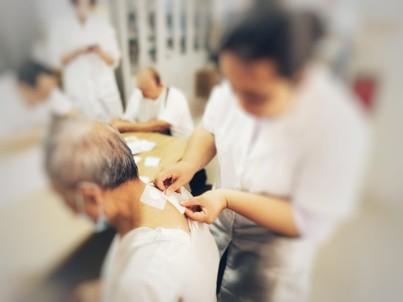Prevention is better than cure, Tranditional Chinese Medicine (TCM) emphasizes making proactive adjustments in response to seasonal changes, rather than relying on reactive treatments after an illness has developed.
“Treating Winter Diseases in Summer” is a classic TCM preventive approach that aligns health practices with seasonal rhythms, aiming to stop illness before it develops.
In Chinese culture, the “dog days” mark the hottest part of the year, when yang energy peaks. Lasting 30–40 days, this period is characterized by intense heat, humidity, and stagnant air. According to TCM, it’s an ideal time to boost immunity and prevent chronic conditions that likely to worse in winter, such as bronchitis, asthma, diarrhea, joint pain or other problems linked to
spleen and
kidney deficiencies.
The preventive therapies are mostly aimed to boost
yang qi, expel internal
coldness and
dampness, and improve circulation. Among those who receive this therapy, chronic bronchitis in elderly people is known to respond particularly well.
“Treating winter diseases in summer” can be provided through orally or tropically.
(I) Oral Remedies
The oral remedies are mostly aimed to warm the kidneys and strengthen yang, such as
Kidney Qi Pill (
shen qi wan) and
Restore the Right (kidney) Pill (
you gui wan). Individuals are usually suggested to take at a low dose for one month.
(II) Herbal Patch Remedies
Herbal patches are given on three specific days during every summer and will be performed for three consecutive years. They help support the overall immunity while rectifying abnormal overly (allergic) reactions of the body.

Herbal patch therapy is a form of external treatment that involves applying medicated patches or plasters to specific areas of the body. The patches are made from a blend of herbal extracts, resins, and other natural ingredients to address various health conditions, particularly pain relief, inflammation, and circulation issues. It is a non-invasive and convenient therapy, which causes minimal systemic side effects compared to oral medications and can be used alongside acupuncture or cupping for enhanced overall therapeutic effects. TCM physicians usually recommend to individuals who have:
- Musculoskeletal problems: Back pain, arthritis, sprains, and muscle stiffness.
- Respiratory conditions: Cough, asthma (patches applied to the chest or back).
- Digestive disorders: Abdominal pain or bloating (applied to the abdomen).
- Gynecological problems: Menstrual cramps or cold uterus syndrome.
Prescription for paste: white mustard seed (20g), corydalis rhizome (15g), Manchurian wildginger (12g), gansui root (10g).
Preparation: grind herbs into powder and mix with ginger juice (from 60g fresh ginger) to form a paste; divide the mixture into 6 portions and spread onto oil paper or plastic film (each paste about 3cm in diameter).
Method: the herbal patches are placed on two acupoint groups alternatively:
- Group (1): fei shu (Bl13), xin shu (Bl15), ge shu (Bl17)
- Group (2): fei shu (Bl13), jing bai lao (Ex-Hn15), gao huang (Bl43)
Place on both sides of the selected acupoints and keep for 4 to 6 hours. If the patches still cause a mild itching or warm feeling, then allow for longer application; if they cause a burning or painful feeling, then they should be taken off earlier.
Precautions:
- Avoid use on broken skin or open wounds.
- Some may experience skin irritation or allergies to certain herbs.
- Not suitable for individuals with fever and active inflammatory conditions, such as swollen joints with fever.
For those who only have a mild degree of weakness, for example likely to experience poor digestion, bloating, fatigue, and brain fog, but without clear signs of deficiency such as cold intolerance or chronic diarrhea, more gentle
tonic remedies may be recommended for summer wellness.



